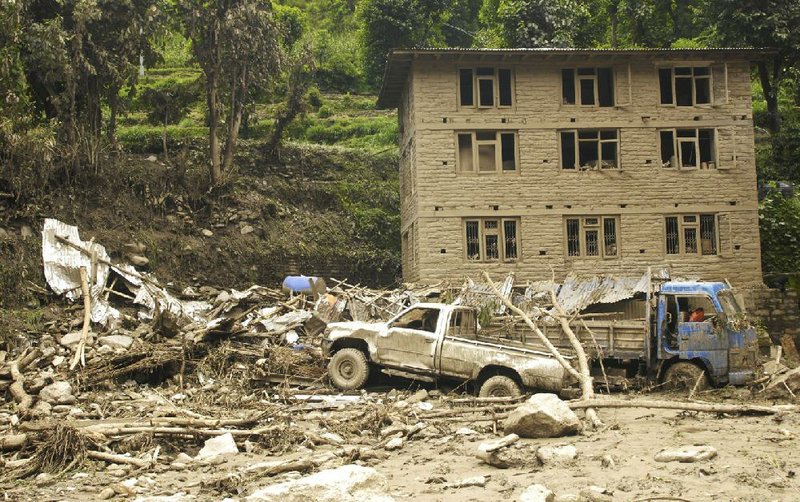Landslide search in Nepal proves futile
KATMANDU, Nepal -- There is no chance of finding any of the more than 150 people who are believed to have been buried by a landslide in northern Nepal, an official said Sunday, as rescuers struggled to dig through piles of rock, mud and trees.
Rescuers have so far recovered only eight bodies since the landslide early Saturday blocked a mountain river, causing the water to form a lake that was threatening to burst and sweep several villages. Fresh rainfall on Sunday hampered search attempts.
Yadav Prasad Koirala, who heads the government's Department of Natural Disaster Management, said it was difficult even for bulldozers and heavy equipment to move the debris that crushed dozens of houses in the village of Mankha, about 75 miles east of Katmandu, Nepal's capital.
Gopal Parajuli, the chief government administrator in the area, said the water level and mud was making the rescue work very difficult, and that army troops used explosives to try to alleviate a dangerous buildup of water.
The controlled explosions managed to knock down part of an earth wall that had blocked a river and created a temporary dam, allowing some water to flow out, but much of it still remained trapped, posing an immediate threat to downstream villages as far away as India, Parajuli said.
Libyan turmoil worsens; fighting kills 22
TRIPOLI, Libya -- A day of militia fighting over control of the international airport in Libya's capital killed 22 people, the country's interim government said Sunday, part of the worsening chaos gripping the country.
Libya is seeing its worst violence since the 2011 civil war that toppled dictator Moammar Gadhafi, as militias made up of the rebels who overthrew him largely run wild in the country, armed with heavy weaponry that outguns its poorly organized security forces.
Saturday's deaths bring the death toll after weeks of fighting for control of Tripoli's international airport, as well as Libya's second-largest city of Benghazi, to 236 people.
Islamist militias from the coastal city of Misrata have led the assault on the airport, seeking to seize it from militiamen from the mountain town of Zintan. Militia shelling has set fire to at least eight huge oil depots, sending plumes of black smoke over Tripoli, Libya's state-run news agency reported Sunday.
Ethnic unrest leaves 100 dead in China
BEIJING -- It was a bloody week in China's far west, with nearly 100 people killed in unrest that the authorities have characterized as terrorism but that Uighur advocacy groups have said is a consequence of a sweeping security crackdown aimed at silencing opposition to the government's hard-line policies in the region.
The outbreak of violence in Xinjiang amid an overwhelming show of security appears to be the worst since 2009, when at least 200 people died during several days of ethnic rioting in the regional capital, Urumqi.
The state-run news media on Sunday provided new details of the most serious episode, a clash last Monday in Yarkand County. A report said that 35 ethnic Han Chinese had been killed and that 59 people described as terrorists had been shot dead by the police.
The report, published by Tianshan, a news portal run by the Xinjiang regional government, said two Uighurs had also been killed during what it described as a rampage by masked, knife-wielding assailants who attacked cars and passers-by in Yarkand, a predominantly Uighur municipality.
Islamic State claims 2 more Iraqi towns
IRBIL, Iraq -- Militants with the Islamic State extremist group on Sunday seized two small towns in northern Iraq after driving out Kurdish security forces, further expanding the territories under their control, officials and residents said.
The fresh gains by the Sunni extremist militants have forced thousands of residents to flee from the religiously mixed towns of Zumar and Sinjar, toward the northern self-ruled Kurdish region, the United Nations said. Some of them were trapped in an open rugged area, it added.
Ninevah province Gov. Atheel al-Nujaifi, who fled to the largely autonomous Kurdish region when the Islamic State group and allied Sunni militants seized Mosul, Iraq's second-largest city, in June, said that the two towns fell after fierce clashes that broke out the day before.
A resident in Sinjar said the militants blew up a small revered Shiite site and two Yazidi shrines. Yazidis are a Kurdish-speaking sect and religious minority. Another resident in Zumar said they took over at least two small oil fields. Both spoke on condition of anonymity for fear of retribution.
-- COMPILED BY DEMOCRAT-GAZETTE STAFF FROM WIRE REPORTS
A Section on 08/04/2014
